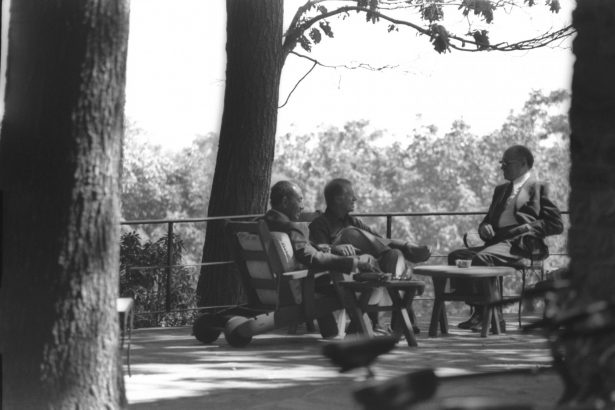Joel Singer, a veteran Israeli peace negotiator, critically reviews Seth Anziska’s book, Preventing Palestine: A Political History from Camp David to Oslo, forcefully rejecting Anziska’s central claim that the peace process has ‘prevented Palestine’. Anziska replies to Singer in this issue of Fathom here.
Seth Anziska’s revisionist book, Preventing Palestine: A Political History from Camp David to Oslo, tells an alternative story to the conventional wisdom regarding the political road that led from the Camp David Accords to the Oslo Agreement (with a detour to the intervening 1982 Lebanon War, which appears to not completely fit organically within his story). As someone who was deeply involved in both ends of this political history, as well as in some other, similar developments in between, reading the book sometimes gave me the feeling that the events it describes belong to some alternate reality.
The book’s main thesis can be summarised as follows: A Palestinian state should and could have been created in 1978, when the Camp David Accords were negotiated. In late 1977, Egyptian President Anwar Sadat made his historic visit to Israel and offered to make peace with Israel in return for full Israeli withdrawal from the Sinai Peninsula, which Israel had conquered and occupied since the 1967 Six-Day War, provided that Israel also agreed to recognise the right of the Palestinians to their own state. Thereafter, in September 1978, US President Jimmy Carter invited Israeli Prime Minister Menachem Begin and Sadat to a summit meeting at the presidential retreat, Camp David, in an attempt to achieve a comprehensive agreement that would include both an Israeli-Egyptian bilateral peace treaty and an agreement to allow Palestinian self-determination. Begin, however, decided to prevent the creation of a Palestinian state (or to ‘prevent Palestine’ in Anziska’s shorthand) and, therefore, he shrewdly devised an alternative idea — a plan for Palestinian autonomy. In Camp David, Begin twisted the arms of both Carter and Sadat and, as a result, the Camp David Accords reflected Begin’s autonomy idea, rather than an agreement to establish a Palestinian state. According to Anziska, this unfortunate outcome of Camp David has continued to haunt all subsequent political plans and agreements related to the Palestinians, all the way through the 1993 Oslo Agreement. In other words, all of these later developments, Anziska argues, have been contaminated by the autonomy plan that Begin advocated in Camp David to prevent the creation of a Palestinian state, and this has well served his objective, as well as that of all subsequent Israeli governments, to keep the West Bank.
Before proceeding to review the book, it is important to clarify that I support the creation of a Palestinian state as part of accomplishing an Israeli-Palestinian agreement, the permanent or final status agreement, as it is called in both the Camp David Accords and the Oslo Agreement. I believe that the Palestinians are entitled to their own state and, further, that it is also an Israeli interest to have a friendly Palestinian state created next to it. Moreover, I fully accept the book’s proposition that the Oslo Agreement is based largely on the Camp David Accords. Indeed, when negotiating the Oslo Agreement in 1993, both my Palestinian colleagues and I kept copies of the Camp David Accords with us and consulted them occasionally. Also, when subsequently drafting the Oslo implementing agreements, I repeatedly used ideas that had been developed years earlier by the Egyptian, American and Israeli delegations during the post-Camp David autonomy talks. So one can correctly conclude that Camp David begot Oslo. However, from this point forward, my views and the book’s path diverge sharply.
As an initial matter, the book must receive the credit it deserves. Anziska did a very good research job and has collected and pieced together an enormous amount of information, including information derived from newly-declassified American and Israeli records, some of which even an avid consumer of books related to the Middle East peace process like me has not previously seen. However, the book fails in improperly allocating its attention among the important players and events that are relevant to the story it attempts to tell.
As to the book’s unbalanced focus, consider these facts: Preventing Palestine devotes no less than 144 pages to the starting point of this political road (Camp David), of which 100 pages cover the period before the Camp David summit was even convened. Conversely, the final point of this road (Oslo) is covered by all of five and a half pages. One would have expected that a book whose title includes the catchy phrase ‘from Camp David to Oslo’ would cover this territory in a more balanced manner. Did Anziska lose steam as he proceeded along this road or did he really intend to focus on Camp David, with Oslo as merely an afterthought? And why did Anziska stop at Oslo? Twenty five years have elapsed since the Oslo Agreement was signed, in which Israelis and Palestinians went well beyond the transitional autonomy arrangements and negotiated, in great detail, the permanent status agreement in several rounds, including the 2000 Camp David II summit (when Israel was led by Prime Minister Ehud Barak) and the 2007 Annapolis Conference (when Israel was led by Prime Minister Ehud Olmert). As to the last of these, even Palestinian negotiators admitted later that peace was then within reach. Nor does the book mention the 2009 Bar-Ilan speech by Begin’s heir as the leader of the right-wing Likud party, Prime Minister Benjamin Netanyahu, in which Netanyahu endorsed the two-state solution, thus deviating sharply from Begin’s original intention to keep control of the West Bank and Gaza (WBG). Is it possible that Anziska decided to disregard all of these subsequent developments because they did not support his conclusion that Begin’s autonomy idea has been the exclusive cause of preventing a Palestinian state in the 40 years subsequent to Camp David?
More important, the book fails to properly analyse the historic events it does cover. History books often single out the Camp David Accords as the most successful US-led peacemaking effort in the Middle East. Building upon previous, post-1973 Yom Kippur War, American-brokered interim agreements between Israel and Egypt, in 1978, Carter launched the most ambitious and risky peacemaking effort ever attempted in the Middle East by inviting Sadat and Begin to a summit meeting in Camp David. Ambitious — because it attempted to go well beyond the resolution of bilateral relations between Egypt and Israel by adding a much larger dimension to the proposed deal — by accomplishing a second agreement regarding the fate of the Palestinian people. Risky — because Carter and Sadat knew well that Begin, who had taken office as Israeli Prime Minister the previous year, and formed the most right-wing government ever to be elected in Israel, held views regarding the WBG that departed sharply from those held by his predecessor left-wing Labour governments. While previous Israeli Labour governments considered the fate of the WBG primarily from the security perspective, Begin and his Likud government asserted a claim to sovereignty over these areas based on Biblical rights and vowed to never withdraw from them. Therefore, Carter’s demand for a resolution of the Palestinian problem in Camp David put Carter and Sadat on a direct collision course with Begin.
Carter and Sadat knew that raising the stakes at Camp David by demanding the resolution of the decades-old Palestinian problem in addition to Israeli-Egyptian bilateral issues, which were very complicated on their own, created the risk that neither set of problems would be resolved, with potential devastating repercussions for all of them.
And yet, following 13 days of hard-nosed bargaining, the parties reached agreement regarding both issues — the Camp David Accords. These accords consisted of two distinct but related documents, one called ‘A Framework for the Conclusion of a Peace Treaty between Egypt and Israel,’ and the other called ‘A Framework for Peace in the Middle East,’ which included, among other things, agreed principles for resolving the Palestinian problem. Carter’s gamble would not have succeeded without the involvement of two bold, first-rate statesmen: Sadat and Begin.
When Sadat made his historic visit to Israel in September 1977 to offer peace to Israel, he was the first Arab leader to break all three taboos enshrined in the Khartoum Declaration adopted shortly after the 1967 Six-Day War by the leaders of 13 Arab states, including Egypt. In this declaration, these Arab leaders pledged to continue their struggle against Israel and accepted the three famous ‘No’s’: No peace with Israel, no negotiations with Israel, and no recognition of Israel.
Begin was thus faced with a historic decision. Sadat’s demand for full withdrawal from the Sinai presented a serious security concern. Israel had previously been forced to twice go to war with Egypt to re-open the strategic passage through the Straits of Tiran, which Egypt had twice blocked for Israeli shipping, in 1956 and 1967. So much so that, since 1967, the official Israeli position (adopted by the much more moderate, previous Labour-led government) was that, in any ultimate peace agreement with Egypt, Israel must retain control of the strategic area of Sharm El-Sheikh that is located at the southern tip of the Sinai and controls the straits. And Moshe Dayan, the Labour Party’s Minister of Defence, famously said in 1971: ‘Better to hold Sharm El-Sheikh without peace [with Egypt] than [have] peace [with Egypt] without this area.’ Sadat’s demand that Israel recognise the Palestinians’ right to statehood posed an even harder problem for Begin. Contrary to his predecessor, moderate Labour-led governments, who had been prepared to return the Gaza Strip to Egypt and the West Bank to Jordan (minus Jerusalem and security-based border modifications) in return for peace, Begin and his right-wing Likud government’s position was that the WBG areas were part of Eretz Israel (the Land of Israel), the Biblical name of Palestine, and that Israel had a sovereign right to all of these areas. But even the previous Labour governments had opposed vehemently the creation of an independent Palestinian state in these areas. As Israeli Prime Minister Golda Meir once famously said: ‘There is no such thing as a Palestinian people.’ And, furthermore, the assumption was that any Palestinian state, if one were to be created, would be controlled by the Palestine Liberation Organisation (PLO), which all Israeli governments until 1993 considered a terrorist organisation whose main objective was to destroy Israel and, therefore, refused to have any contacts with it. So for Begin to accept Sadat’s demand (1) to agree to give up the WBG; (2) to agree to a process that might lead to establishing an independent Palestinian state in the WBG; (3) likely to be run by the PLO, was the equivalent of having to cross not one but three separate Rubicons.
During the Camp David summit, Carter and Sadat joined forces in putting pressure on Begin until they managed to extract from him not only an agreement to fully withdraw all Israeli forces from the Sinai but also, on the Palestinian question, his agreement to the following main principles, which were all embedded in the accords.
- that there is a Palestinian people;
- that the Palestinians will participate in determining their future, including by participating in negotiations with Israel, Egypt and Jordan regarding the final status of the WBG to be concluded within five years;
- that, during the five-year transitional period, Israeli forces must withdraw from the WBG and the remaining forces must redeploy into specified security locations;
- that the final status agreement to be concluded for the WBG must recognise the legitimate right of the Palestinian people and their just requirements; and
- that the final status agreement must be based on all the provisions and principles of UN Security Council Resolution 242 (which called for Israeli withdrawal from territories occupied in the Six Day War, i.e., the WBG).
In sum, Begin gave up on each of his long-standing positions. And, while the Camp David Accords did not specifically state that Begin agreed to the creation of a Palestinian state, it was understood by all that this would likely be the natural outcome of this agreement. Indeed, shortly after Begin returned to Israel after the signing of these accords in Washington, DC, a large portion of his party’s Knesset members voted against ratifying it and subsequently broke away from the Likud and formed a new opposition party; other Likud Knesset members stayed with the party but still voted against ratifying the accords or simply abstained. But for the support of the opposition Labour Party in the Knesset vote, Begin would not have been able to get the agreement ratified.
As for Carter, no other US president before him or thereafter has devoted so much energy and time to personally attempt to resolve the Israeli-Palestinian conflict. Yet he got no political benefit from the successful conclusion of Camp David. Instead, two years later, Carter failed in his bid for re-election in 1980. In 1981, Sadat was assassinated, primarily because of the peace he had made with Israel in Camp David.
Seth Anziska’s reaction to the dramatic concessions that Carter and Sadat caused Begin to make and, more generally, the legacy of the Camp David Accords, is essentially: ‘Meh!’ And why? Because, according to Anziska, the Camp David Accords were not a momentous accomplishment in the history of Middle East peacemaking, as the rest of the world believes, but instead a missed opportunity of grand proportions to create, there and then, a PLO-run, independent Palestinian state. This baseless assertion reminds me of an old Jewish joke:
A Jewish grandmother is watching her grandchild playing on the beach when a huge wave comes and takes him out to sea. She pleads: ‘Please God, save my only grandson. I beg of you, bring him back.’ And a big wave comes and washes the boy back onto the beach, good as new. She looks up to heaven and says: ‘But he also had a hat!’
Not that I compare the purported missed opportunity to create a Palestinian state in Camp David to the missing hat in that joke. As indicated earlier, I support the creation of a Palestinian state. Rather, my criticism of the book results from two separate fundamental errors made by Anziska: First, the author’s entirely incorrect conclusion that the creation of a PLO-led Palestinian state was possible in Camp David. Second, his failure to recognise the great efforts invested by Carter and Sadat to take advantage of the Israel-Egypt rapprochement to also enhance the Palestinian cause, as well as Begin’s ability and willingness to rise to the occasion and make huge sacrifices for peace, thereby betraying both his political base and his own long-standing beliefs. Instead, the book repeatedly criticises these three leaders. Carter is accused of succumbing to Israel and to pro-Israel Jewish American pressures that caused him to not insist on including the PLO in the Camp David summit and otherwise preferring to concentrate on more global issues, as well as his re-election, and thereby not following through on his original idea that a Palestinian state should be created. But Carter was likely the most pro-Palestinian US president ever elected.
In the same vein, the book accuses Sadat of preferring to strike a bilateral agreement with Israel rather than insisting on a comprehensive deal that would also include resolving the Palestinian question. But Sadat did more than any other Arab leader at the time in demanding Israeli concessions relating to the Palestinians, as part of negotiating bilateral arrangements with Israel. Having negotiated with all of Israel’s Arab neighbours, I can confirm that none of them raised any demand regarding the Palestinians. Syria didn’t do so. Jordan didn’t do so. Lebanon didn’t do so. They each focused exclusively on their own issues. None demanded that, in addition to issues relating to their own interests, Israel should also accept requirements associated with Palestinian issues (or issues related to any other Arab neighbours, for that matter). Even the PLO, after it finally agreed to recognise Israel and stop the use of terrorism, which opened the door to the 1993 Oslo Agreement, did not make any demands relating to any Arab country in its negotiations with Israel; rather, all PLO demands related exclusively to Palestinian issues. Egypt was the only exception. In Camp David, Egypt conditioned the conclusion of its bilateral deal with Israel on Israeli acceptance of additional demands relating to the Palestinians. And, as indicated above, Sadat managed to extract from Begin significant concessions related to the Palestinians.
As to Begin, notwithstanding his many concessions in Camp David, his views regarding the scope of the Palestinian autonomy were quite restrictive. Primarily, Begin’s position was that autonomy would be ‘personal,’ that is, the authority of the Palestinian Council would apply to the inhabitants of the WBG, and not to the territory (whereas the Egyptian position was that authority of the Palestinian Council must cover the WBG territory as well as its inhabitants). While working for Begin for several years after the Camp David Accords were signed in developing detailed plans for implementing his autonomy vision, I attempted many times, but unsuccessfully, to convince him and his advisers to expand the scope of the Palestinian autonomy. From Begin’s perspective, however, his sacrifices in Camp David should not have been measured based on the Egyptian, American or Palestinian expectations, but rather in comparison to his previous, long-standing positions. And when viewed from this vantage point, Begin’s concessions were enormous.
But for Anziska they were not sufficient. His book is not concerned at all with the scope of autonomy proposed by Begin or that proposed by Sadat. Rather, Anziska criticises Sadat for a much more fundamental ‘sin,’ that is, accepting a transitional arrangement of Palestinian autonomy in Camp David instead of insisting on Israeli agreement to the creation of a Palestinian state. Never mind that in 1978 the PLO refused to recognise Israel. Never mind that at that time the PLO also refused to accept UN Security Council Resolution 242. Never mind that, at that time and many years later, the PLO refused to stop terrorism against Israelis and Jews. Thus, in March 1978, six months before the Camp David Accords were signed, the PLO conducted the deadliest terrorist attack in Israeli history, known as the Coastal Road massacre, which involved the hijacking of a bus on Israel‘s Coastal Highway in which 38 Israeli civilians, including 13 children, were killed, and 71 were wounded. The attack was planned by Yasser Arafat’s deputy, Abu Jihad, and carried out by the PLO faction Fatah. And in 1985, seven years after Camp David, a group of terrorists belonging to the PLO hijacked the Italian cruise ship Achilles Lauro and murdered a disabled American Jew called Leon Klinghoffer, throwing him to the sea while he was bound to his wheelchair.
It must have been clear to Anziska that, in these circumstances, not only Begin but any other more moderate Israeli leader would have rejected an Egyptian or American demand that Israel agree to a PLO-run Palestinian state. So his argument — the book’s main argument – that Egypt should have nonetheless insisted on Israel’s acceptance of such a condition, necessarily means that Anziska’s view is that Egypt should have foregone the peace treaty and the return of the Sinai until Israel accepted this condition. Which may mean that there could have not been peace between Egypt and Israel, even today. As bizarre as this view may sound, Anziska is not alone in this view. In fact, his argument echoes the positions taken at that time by Libyan President Muammar Gaddafi and Syrian President Hafez al-Assad, who led several other Arab countries in condemning Sadat for breaking Arab solidarity by agreeing to make a separate peace with Israel, rather than proceeding against Israel in unison while protecting all Arab interests (including those of the Palestinians), and subsequently suspending Egypt from the Arab League.
Over time, Arab countries have come to terms with the new reality of the Egypt-Israel peace, re-accepted Egypt in the Arab League, and finally, in the context of the 1991 Madrid Conference, agreed to commence negotiations with Israel on separate tracks. Importantly, in 1991, the Palestinians agreed to participate in the Madrid Conference-based peace process, even though the PLO was itself excluded from these discussions. Moreover, there was no promise that a Palestinian state would necessarily be created at the end of the Madrid process; instead, the Letters of Invitation sent out by the US and the Soviet Union to all of the Madrid Conference participants specifically stated that the objective of the discussions as far as the Palestinians were concerned was only the establishment of a five-year transitional period of Palestinian autonomy. Which was exactly what the Camp David Accords had sought. Two years later, the PLO itself accepted the Oslo Agreement’s premise that the parties would work together to establish Palestinian autonomy without any advance Israeli promise that the ultimate outcome would necessarily be a Palestinian state. Notwithstanding this change of heart of the Arab world, the Palestinians and the PLO, Anziska appears to be more demanding than all of them as he continues to level sharp criticism at Carter and Sadat for not involving the PLO and for not demanding that Israel accept a Palestinian state many years earlier in Camp David.
Indeed, Preventing Palestine is a PLO apologetic in reference to the Camp David period, when the PLO was still involved in terrorism, did not recognise Israel, did not accept UN Security Council Resolution 242 and remained committed to implementing the main objective of the Palestinian Charter that called for the destruction of Israel. For Anziska, the PLO terrorists who participated in the Israel Coastal Road massacre in 1978 are ‘commandos’ or ‘militants’. The book also suggests that the focus should not have been placed on the PLO’s terror attacks in the late 1970s (that is, at the time of Camp David). Instead, Anziska argues, at that time, the PLO began a process of moderation, pointing to the March 1977 Cairo Declaration of the Palestinian National Council (the PLO’s legislative arm) as an expression of such moderation. But that declaration in fact rejected UN Security Council Resolution 242 and vowed to escalate armed struggle against the ‘racist Zionist regime,’ aka the State of Israel.
At the same time, however, Anziska’s book does not always sympathise with the PLO. On one important issue, Preventing Palestine criticises the PLO: For accepting the Oslo Agreement, which, according to Anziska, was the template for a sub-sovereign Palestinian entity based on the blueprint introduced by Begin into Camp David 15 years earlier. And while Anziska concedes that Yossi Beilin, one of the main ‘architects’ of the Oslo Agreement, had suggested that Palestinian statehood was the inevitable outcome of autonomy, he criticises Israeli Prime Minister Yitzhak Rabin for never considering sovereign statehood ‘outright,’ when he shepherded the Oslo Agreement.
As someone who was very involved at both ends (Camp David and Oslo) and throughout the period of the peace processes covered in Preventing Palestine, I do not particularly appreciate these assertions and criticisms. They demonstrate Anziska’s misunderstanding of the issues covered by his book. For starters, he completely confuses cause and effect. A Palestinian state was not prevented because the Camp David Accords and Oslo Agreement did not call for such a state and instead selected autonomy, as Anziska argues; to the contrary, these agreements simply reflected the reality that the parties were not able at those points in time to reach agreement on Palestinian statehood, and autonomy appeared to all parties an acceptable, interim compromise. And Anziska’s classification of both Rabin and Begin (or both Oslo and Camp David) as belonging to the same category of those ‘preventing Palestine’ is flatly wrong. Begin intended the Camp David process to result in perpetuating Israeli control of the WBG, whereas Rabin intended the Oslo process to lead to a Palestinian entity separate from Israel. While Rabin was careful not to use the words ‘independent state,’ as he struggled to obtain wide Israeli support for the Oslo Agreement, he knew well that he was leading Israel towards that outcome. Thus, when in 1993 a Rabin aide asked me to review and provide comments on a draft speech that Rabin intended to make in the Israeli Knesset immediately after the signing of the Oslo Agreement, he confided in me that, to facilitate obtaining the support of a majority of Knesset members for the agreement, the aide had proposed to Rabin that he include a statement in that speech that Oslo would not lead to a Palestinian state. However, Rabin, known as a person whose words always matched his intentions, overruled that idea, insisting he could not say that. Moreover, when I negotiated the Oslo Agreement with PLO representatives in Norway, Rabin — through me — extended an invitation to Arafat and the PLO leadership to relocate from Tunisia, where the PLO was then headquartered, to the WBG and take control of the Palestinian Council, which was to be established there under the Oslo Agreement. Rabin also discarded Begin’s approach to autonomy as ‘personal’ rather than territorial. Further, Rabin proposed that Arafat arrive in the WBG with an armed Palestinian security force. This force was not intended to simply constitute a small unit of armed bodyguards to protect Arafat, but rather a large Palestinian military force (called ‘Police’ in the Oslo Agreement jargon) that would take responsibility, side by side with Israel, for maintaining internal security for Palestinians in the WBG. And to be clear, it was Rabin who suggested to Arafat that he and the PLO leadership were invited to relocate to the WBG, rather than Arafat suggesting it to Rabin. Similarly, it was Rabin, rather than Arafat, who proposed that the Palestinians be given responsibility for internal security during the autonomy period. More than anything else, these three elements of the Oslo Agreement demonstrate that, unlike Begin, who 15 years earlier invented the autonomy idea as a permanent solution for the WBG, Rabin genuinely intended the Oslo version of autonomy to be a real transitory arrangement that would ultimately lead to the creation of a separate Palestinian political entity.
Without diminishing from the significance of Israeli obstacles placed on the path to Palestinian statehood (primarily, continued settlement activity), the fact that notwithstanding Rabin’s clear intentions, Oslo has not yet led to the creation of a Palestinian state is due in large part to Palestinian conduct following the signing of that agreement. This included, primarily, the Palestinian failure to live up to their responsibility to maintain security in the WBG, which led to the 2007 Hamas seizure of the Gaza Strip. So, how can Israel be assured that a Palestinian state, once created, will not also fall quickly into the hands of Hamas? Or Iran? Also contributing to the impasse is the continued Palestinian refusal to recognise Israel as a Jewish state (while insisting on establishing a Palestinian state in the WBG), which many Israelis say reflects the desire to implement the alleged Palestinian ‘right of return’ to Israel. That is, to destroy Israel as a Jewish state.
All of this is missing in Anziska’s book, which — perhaps because it entirely incorporates Palestinian attitudes — repeatedly blames everyone else (the US, Egypt and Israel), other than the Palestinians themselves, for the fact that a Palestinian state has not yet been established. Unlike Anziska, I don’t believe a Palestinian state has been ‘prevented’. It has undoubtedly been postponed. This is due to various obstacles placed on its path for which the two parties are responsible in almost equal shares. If the parties understand this reality, identify these obstacles and work collaboratively to remove them, the two-state solution will again become viable.






































I was present at a discussion of this book by the author and others at Kings College London a few years ago, and agree with most of your article.
Anziska took a totally one sided aproach to the entire ‘Arab – Israeli’ conflict without any nuance.
To him there appears only one point of view; that of the Palestinians.
Any ideas or views that contradicted his vision seemed to be either ignored or were denigrated.
I have not read the book; my opinon is based solely on being present at that meeting, and what I heard there